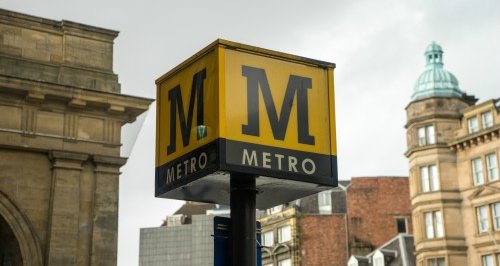Plans For Full Glasgow Metro
29 April 2019, 11:17 | Updated: 29 April 2019, 11:18

Plans to develop a Glasgow-wide Metro system are among a number of "bold, ambitious and transformative" proposals put forward by an independent commission to reshape the city's transport systems in the decades ahead.
Under the "radical" vision, the Glasgow Metro would be a network of high-capacity rapid-transit lines serving as much of the city as possible, with a particular focus on those areas currently poorly served by public transport.
The blueprint from the Glasgow Connectivity Commission also puts forward plans to link the city's two main stations by a tunnel and explores preparing the city for the HS2 high speed rail services.
The recommendations aim to reconnect left-behind areas to the city described as the engine room of the Scottish economy, and to transform the economic performance of the region to the tune of billions of pounds each year.
The commission, chaired by Professor David Begg, was established by city council leader Susan Aitken in November 2017 and its first report, out last year, explored how the local authority could transform the city centre and reverse a steep decline in bus use.
Its second report now looks at matters outwith the council's control, namely the road and rail network.
It found that Glasgow has a good transport network by UK standards, but that it falls "substantially short" compared to some European cities.
"The most glaringly obvious omission from Glasgow's current transport system is the absence of the kind of comprehensive, modern rapid transit system serving inner urban destinations that just nearly all of Glasgow's comparator cities have been busy building for the last 30-40 years," the report stated.
The Commission also found that areas of the city suffering high rates of socio-economic deprivation tend also to have poor transport access to the city centre.
It said the first priority of a strategy to transform the fixed public transport network should be the creation of a comprehensive Glasgow Metro.
"The Glasgow Metro would be a network of high capacity rapid transit lines serving as much of the city as possible so that the fixed transport system plays the fullest possible role in ensuring inclusive growth across the city's communities, sustaining the international competitiveness of the key employment concentrations in and around the city centre," the report said.
The Metro could be created from parts of the existing heavy rail network, re-opened sections of dormant infrastructure, wholly new sections of route and on-street tram running, it is proposed.
Officials recommended building a link between Glasgow Airport and Paisley Gilmour Street Station as the first leg of a Metro line that would then be extended to connect Renfrew, Braehead and Queen Elizabeth University Hospital to the city centre - a route described as the south Clyde growth corridor.
This first leg should be completed by 2025 and the importance of the corridor means "it is no longer appropriate to conceive a rail link to the airport as a freestanding project" the report noted.
The Commission found that the separation of the city's two main railway stations is one of the main barriers to connectivity in the area.
It has recommended connecting Glasgow Central and Queen Street stations by a tunnel, providing 20 trains an hour across the city and transforming rail services across Scotland's central belt.
"It would be possible to combine the Edinburgh and Ayrshire express services giving the whole of the central belt a world class regional express network making Glasgow city centre unambiguously the most accessible place in Scotland," the report said.
The experts further recommended redesigning Glasgow Central to accommodate HS2 trains.
This would include extending the station over the Clyde and involve the creation of a new southern concourse.
Other key recommendations in the report included developing plans for bus priority on Glasgow's motorway network and preparing for the shift to electric and autonomous vehicles by considering new methods of road charging.
The various measures would cost around £500 million a year, based on previous estimates, and could help close the productivity gap between Glasgow and the rest of the UK, generating £4.6 billion a year for the Scottish economy, the report suggested.
Professor Begg said the report's recommendations were achievable and have positive business cases.
He said: "The proposals we have recommended here will deliver a step-change in Glasgow's economic performance and drive Scotland's ambitions to deliver stronger, sustainable, inclusive growth.
"They are bold, ambitious and transformative but we are also confident that they are achievable and the right response to secure Glasgow's long-term economic prosperity."
Ms Aitken said the proposals are worthy of detailed consideration.
Transport Secretary Michael Matheson said it was encouraging to see Scotland's largest city fully considering what a future system could offer.
He said: "The Commission's report is timely as Transport Scotland takes forward a nationwide assessment of transport requirements with work on an updated National Transport Strategy and the second Strategic Transport Projects Review under way.
"We will consider these recommendations as part of our appraisal, allowing us to balance the needs of communities around the country."






